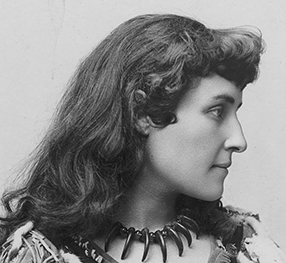A Cry from an Indian Wife
My Forest Brave, my Red-skin love, farewell;
We may not meet to-morrow; who can tell
What mighty ills befall our little band,
Or what you’ll suffer from the white man’s hand?
Here is your knife! I thought ’twas sheathed for aye.
No roaming bison calls for it to-day;
No hide of prairie cattle will it maim;
The plains are bare, it seeks a nobler game:
’Twill drink the life-blood of a soldier host.
Go; rise and strike, no matter what the cost.
Yet stay. Revolt not at the Union Jack,
Nor raise Thy hand against this stripling pack
Of white-faced warriors, marching West to quell
Our fallen tribe that rises to rebel.
They all are young and beautiful and good;
Curse to the war that drinks their harmless blood.
Curse to the fate that brought them from the East
To be our chiefs—to make our nation least
That breathes the air of this vast continent.
Still their new rule and council is well meant.
They but forget we Indians owned the land
From ocean unto ocean; that they stand
Upon a soil that centuries agone
Was our sole kingdom and our right alone.
They never think how they would feel to-day,
If some great nation came from far away,
Wresting their country from their hapless braves,
Giving what they gave us—but wars and graves.
Then go and strike for liberty and life,
And bring back honour to your Indian wife.
Your wife? Ah, what of that, who cares for me?
Who pities my poor love and agony?
What white-robed priest prays for your safety here,
As prayer is said for every volunteer
That swells the ranks that Canada sends out?
Who prays for vict’ry for the Indian scout?
Who prays for our poor nation lying low?
None—therefore take your tomahawk and go.
My heart may break and burn into its core,
But I am strong to bid you go to war.
Yet stay, my heart is not the only one
That grieves the loss of husband and of son;
Think of the mothers o’er the inland seas;
Think of the pale-faced maiden on her knees;
One pleads her God to guard some sweet-faced child
That marches on toward the North-West wild.
The other prays to shield her love form harm,
To strengthen his young, proud uplifted arm.
Ah, how her white face quivers thus to think,
Your tomahawk his life’s best blood will drink.
She never thinks of my wild aching breast,
Nor prays for your dark face and eagle crest
Endangered by a thousand rifle balls,
My heart the target if my warrior falls.
O! coward self I hesitate no more;
Go forth, and win the glories of the war.
Go forth, nor bend to greed of white men’s hands,
By right, by birth we Indians own these lands,
Though starved, crushed, plundered, lies our nation low . . .
Perhaps the white man’s God has willed it so.
Copyright © 2024 by Emily Pauline Johnson. Originally published in Poem-a-Day on November 30, 2024, by the Academy of American Poets.
“A Cry from an Indian Wife” originally appeared in Emily Pauline Johnson’s first volume of poetry, The White Wampum, which was published in 1895 in Boston, London, and Toronto by Lamson, Wolffe and Company, John Lane, and the Copp Clark Company, respectively. The poem later appears in Flint and Feather: The Complete Poems of E. Pauline Johnson (The Musson Book Company Ltd., 1912). In their essay, “Flint, Feather, and Other Material Selves: Negotiating the Performance Poetics of E. Pauline Johnson,” Manina Jones and Neal Ferris noted, “Given the Mohawk name’s meaning, ‘double wampum’ or ‘double life,’ it can be seen as a deliberate political reference to Six Nations sovereignty materially manifest in the Two Row Wampum, a well-known shell bead record belt symbolically recording Six Nations foreign policy toward other sovereign nations […]. In fact, the Two Row Wampum ‘is the philosophical foundation of how the Haudenosaunee have conducted themselves politically in relation to Europeans.’ The title of Johnson’s first book of poetry, The White Wampum (1895), might thus be read as highlighting the relationship between that Iroquois iconography and Johnson’s own role as a cultural mediator based on her aesthetic practice. While Johnson had published on both Anglo and Native subjects, the beginning of her career as a performer is dated to a famous evening of Canadian poetry in 1892, when she recited to a highly appreciative Toronto audience a series of Native-themed poems, including ‘A Cry from an Indian Wife,’ ‘The Avenger,’ and ‘As Red Men Die.’”

